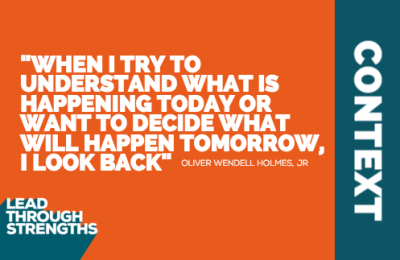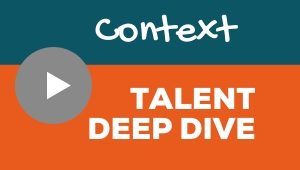How To Apply CliftonStrengths Context At Work
StrengthsFinder Definition - Context
Often people will ask us, "What does it mean to have the Context Strength?" First, know that StrengthsFinder will help you figure out your potential. We call them natural talents or natural patterns. We know you're here because you want to turn them into superpowers in your career, so here's the gist: People exceptionally talented in the Context theme enjoy thinking about the past. They understand the present by researching its history. Here's the full list of CliftonStrengths definitions so you can check out your other talents as well.
Gallup®, Clifton StrengthsFinder®, StrengthsFinder®, and each of the 34 Clifton StrengthsFinder theme names are trademarks of Gallup, Inc.
CliftonStrengths Context - Learn All About It
Your Strengths Will Strengthen Your Performance At Work
In the next section, you'll explore what fuels you up and what drains you. Just like gas (or petrol) in your car, you need to keep your personal tank full to be at your best. Each StrengthsFinder talent theme is energized and drained by different things. When you see the stick figure who looks strong, you can consider how these things fuel you up at work. They're your energy makers. When you see the stick figure who looks weak, consider if these things are draining you at work. They're your energy takers.
 Yucks for CliftonStrengths Context
Yucks for CliftonStrengths Context
What's a Yuck?
It's a situation, condition, or behavior you might see at work that zaps your energy. Yucks are also things you see on your calendar or to-do list that make you think, "Yuck, if I never had to do that again I'd be thrilled."
Yuck Situations for Context
- When the past is forgotten or disregarded
- Repeating the same mistakes at work, and not proactively avoiding failure by learning from the past
 Yays for CliftonStrengths
Yays for CliftonStrengths
Context
What's a Yay?
It's a situation at work that boosts up your energy or makes you feel productive. Yays are also things you see on your calendar or to-do list that make you think, “Yay, fill my days with this."
Yay Situations for Context
- Researching past situations to apply lessons today
- Learning the backstory about how you got where you are today so it can be applied to your current team
 How CliftonStrengths Context Can Be Perceived When Starved
How CliftonStrengths Context Can Be Perceived When Starved
What's a Starved Talent?
This section describes how you might be perceived when the shadow side of your talent is showing. It’s when you’re overusing, misapplying, or squashing one of your natural talents rather than turning it into a strength. We often see people starve, squash, or ignore their talent when they assume it is not valued in that role or company culture.
Perceptions of Starved Context
- Stuck in the past
- Slow to move forward
- Rehashing
 How CliftonStrengths Context Can Be Perceived When Fed
How CliftonStrengths Context Can Be Perceived When Fed
What's a Fed Talent?
This section describes how you might be perceived when the best version of you shows up at work. It’s when you’ve invested in your natural talents to mature them into strengths. You can feed your talent by considering “how” you approach each “what” on the job. When you apply your talents to productive outcomes, you’re feeding them.
Perceptions of Fed Context
- Appreciative of predecessors
- Celebrator of history
- Connector of past
 Situations That Make CliftonStrengths Context Feel Insulted
Situations That Make CliftonStrengths Context Feel Insulted
What's An Insulted Talent?
Usually, talents get offended or insulted by other people who have natural preferences that are different from yours. It also happens if they fail to see their actions have an impact on someone else (you!). You can also insult your own talents if you have a "troublemaker strength" that speaks loudly and overpowers this one.
Things That Will Insult Context
- Put a lopsided focus on the future and the vision.
- Skip over debriefs or post mortems.
- Say things like "the past is the past - it is gone."
 Situations That Make CliftonStrengths Context Feel Honored
Situations That Make CliftonStrengths Context Feel Honored
What's An Honored Talent?
Usually, talents feel honored when other people acknowledge your needs and potential contributions. Talents feel honored when someone “extends an olive branch” to help you work at your best. You can also honor your own talents by investing in them, by choosing work that naturally calls on them, or by applying your strengths to performance on the job.
Things That Will Honor Context
- Uncovering and applying what got us here
- Provide background information about your decisions.
- Examine past behaviors to predict future actions.
Personal Brand - 'How' CliftonStrengths Context Operates At Work
 Most people have a good handle on "What" they bring to the workplace. Resumes, CVs, and career development conversations are filled with lists of skills and job titles that show "what" you can do. Nearly everyone misses the "How".
Most people have a good handle on "What" they bring to the workplace. Resumes, CVs, and career development conversations are filled with lists of skills and job titles that show "what" you can do. Nearly everyone misses the "How".
Your Clifton StrengthsFinder talent themes help you communicate "How" you show up. It's how you think. It's how you feel. It's how you act. These are huge differences in each person that are differentiators on the job. Consider these adjectives you might want to consciously put into your personal branding efforts.
We recommend working a "How" description into the Summary section in your LinkedIn profile (if you don't yet use that section, don't worry, most people haven't paid attention to it until now). Of course, make up adjectives or phrases that describe you at your best. Try to avoid words like "motivated, self-starter" because they're so overused that you'll blend in with everyone else. Here are some ideas to spark your thinking:
- Grounded
- Researcher
- Company Storyteller
- Perceptive
- Highlighter
- Business Unit Biographer
- Studious
- Collector
- Culture Keeper
- Archiver
- Recorder
- Wise
- History Buff
- Trend Spotter
- Comparer of Then & Now
- Corporate Archaeologist
How To Invest In Your CliftonStrengths Context Talent On The Job
- Collect memories through photographs and written materials — they can be motivational for you.
- Read historical novels, non-fiction, or biographies. You will discover many insights that will help you understand the present. You will think more clearly.
- Before planning begins on a project, encourage your colleagues to study past projects. Help them appreciate the statement that “those who cannot remember the past are condemned to repeat it.”
- If you are in a role that requires teaching others, build your lessons around case studies. You will enjoy the search for the appropriate case, and your students will learn from these precedents. Use your understanding of the past to help others map the future.
- Help your organization strengthen its culture via folklore. For example, collect symbols and stories that represent the best of the past, or suggest naming an award after a person who embodied the best of the past.
- Partner with someone with a strong Futuristic or Strategic theme. This person’s fascination with what “could be” will stop you from becoming mired in the past, while your deep understanding of Context will stop him or her from ignoring the lessons of the past. Together you are more likely to create something that lasts.
- Accept change. Remember that the Context theme does not equate with “living in the past.” Instead, you can actually become known as an active agent for positive change. Your strong Context theme should allow you to identify more clearly than most the aspects of the past that can be discarded, and those that must be retained in order to build a sustainable future.
Tips For Managing Someone Who Leads Through The CliftonStrengths Context Talent
- When you ask this person to do something, take time to explain the thinking that led to this request for action. They need to understand the background for a course of action before they can commit to it.
- When you introduce them to new colleagues, ask these colleagues to talk about their background before you all get down to business.
- During meetings always turn to them to review what has been done and what has been learned up to the present time. Instinctively, they will want others to be aware of the context of decision-making.
- They think in terms of case studies; that is, when did we meet a similar situation, what did we do, what happened, what did we learn? You can expect them to use this talent to help others learn, especially when the need for case studies is important. No matter what the subject matter, ask them to collect revealing anecdotes, to highlight the key discovery from each anecdote, and perhaps to build a class around these case studies.
- They can do the same in relation to your organization’s culture. Ask them to collect anecdotes of people behaving in a way that exemplifies the cornerstones of the culture. Their anecdotes, retold in newsletters, training classes, Web sites, videos, and so on, will strengthen your culture.
Tips For Managing Someone Who Leads Through The CliftonStrengths Context
- Ask this person to partner with you when you need to review archives or do a corporate Archeology or Anthropology study that looks to the past to inform your current decisions.
- When your team needs to trace root causes or linage, this person will often enjoy helping. Even for things like studying past actions for legal purposes - this person is great at gathering and understanding the backstory to make it useful for today.
- Call on them when you need someone to maintain and collect your organization’s documents and artifacts so that lessons from the past do not get lost.
Turn CliftonStrengths Context Into A Strength This Month By Making It Your Phone Lock Screen
 Click on this thumbnail image of your StrengthsFinder talent theme to link to the full size image. Then save it to your phone or mobile device as your lock screen.
Click on this thumbnail image of your StrengthsFinder talent theme to link to the full size image. Then save it to your phone or mobile device as your lock screen.
That way, you’ll be reminded of your plan to focus on that talent…oh…about 98 times per day when you unlock your phone. What a great way to keep your intention front-of-mind! This will help you remember to invest in this talent theme so you can take the untapped potential and turn the natural talent into a strength.
Who knew wallpaper images could be so valuable to your career?! Here are all of the lock screen images if you want to grab an image for a different CliftonStrengths talent.



